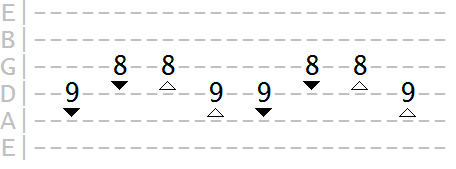Home › Q&A
Improving Down Stroke When Sweep Picking
Question by Josh Dada
(fort McMurray )
I've been playing guitar for just about two years now and I've started to practice very difficult techniques so I can master than as soon as possible.
It seems that my down stroke is much slower and less accurate than my up stroke (from thin to thick string) when I'm practicing my sweeps with a metronome. It's like my muscles are just not used to going in that direction and I have to strain my arm (bicep area) to down stroke properly.
Also, while I'm practicing economy picking or shredding, it seems that when I play links going from thick to thin string (ascending) I have a very hard time even keeping the pick hitting every note, my arm becomes very very tense, and it feels like I'm flexing when I try to do so, but my descending (from thin to thick) runs and sweeps are so much smoother.
Any help on how to improve down stroke sweep and picking? Do I just need to practice more?
Suggestions
Josh, it's clearly time to refocus your practice time on your down strokes, but you'll need to take a few steps back. Practicing more of the same will simply further ingrain any bad habits.It may be necessary to go "back to basics" with your down strokes. You've inadvertently developed a type of unwanted muscle memory - tensing your arm when down stroking. Tension is a very common problem for guitarists and it can lead to strain injury later on, so it needs sorting.
The solution is to retreat back to the point where you were actually thinking about your pick hand movement, when you were doing things a lot more consciously. That is the "critical period" as far as avoiding, or ironing out any unwanted muscle activity.
As time goes on, as I'm sure you know, you'll think less and less about your pick hand movement and it'll become automatic. But it carries with it all the subtle habits you've persistently rehearsed, whether knowingly or unknowingly.
Here's what I would do...
First, make sure the word "RELAX!" is at the front of your mind every time you work on your down strokes. Every time you feel your arm tensing up, stop, shake it off and refocus on that part of your arm. Actually think about relaxing the muscle. I know it's unnatural to think about muscle activity, but you won't have to do it for very long.
Go back to some simple, two string sweeps, using only down strokes at first.
For example, divide up a major arpeggio pattern into string pairings and focus on your pick hand/arm. Repeat each string pairing a good number of times until you can down stroke smoothly, without tensing up.
The reason I would go back to two string sweeps is because you'll have less to think about with your fret hand, allowing you to give your pick hand/arm more attention.
Add in the up stroke when you can down sweep the string pairings smoothly.
For example...

I'm sure this is a familiar exercise to you if you already learned sweep/economy picking.
It's then just a case of moving on to three string sweeps, again first using only down strokes, focusing on the tension (or lack thereof!) in your arm and then adding in the up strokes when you can down stroke smoothly.
If no matter how much you try the tension remains (it could be like an uncontrollable spasm), another possible solution would be to change the angle of your pick attack.
This is even more of a "back to basics" solution so I think we should cross that bridge when/if we come to it.
There is also the option of trying strict alternate picking instead of economy picking (although obviously this won't apply to sweep arpeggios).
Some guitarists (myself included) start out by using economy picking, almost without thinking about it, but then refocus on strict alternate picking for more control and momentum.
Other guitarists start out using strict alternate picking and then find economy picking more comfortable.
Everyone's different, but if your up strokes and descending runs are smooth, that's a pretty good sign you can get your down strokes up to par without any radical change in how you pick.
Josh, use the comments link below to keep us informed of your progress.
Share Your Comments
|
||
|
||
|
||
|
||
|
||